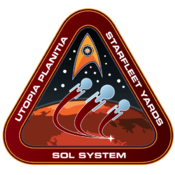Intrepid class/Design History & Achievements
| Utopia Planitia Fleet Yards |
|---|
|
EXPLORERS
Emergency Medical HologramDuring an emergency, the Mark 1 Emergency Medical Hologram (EMH) was designed to supplement the medical staff. In the event a ship's doctor was incapacitated or killed, the EMH could perform as the ship's primary physician for 1500 hours of service. Versed in over 5 million medical procedures, it was deemed an adequate, if impersonal, replacement. Subsequent models have improved the program's inter-personal skills and have lead to the inclusion of the Emergency Engineering Hologram found on many ships. Landing AbilityThe Intrepid platform also includes abilities not seen on many classes before or after its inception, such as the ability to land on a planet's surface to effect repairs or resupply. During Voyager's long voyage across the Delta Quadrant, this was put to good use on multiple occasions, most notably near the end of their trek when the chief engineer used an uninhabited planet as a drydock to repair major systems such as the warp and impulse engines. Dilithium-Lined Swirl ChamberFirst utilized in the Constitution class refit of the 2270s, the dilithium-lined swirl chamber of Intrepid's class 9 warp drive increased the structural integrity of the chamber and the engine's power output. The design also allowed the Intrepid platform to hit a 790,000 metric ton recommendation, which in turn made the ship more nimble and energy efficient. Bio-Neural Gel PacksThe first of their kind, this implementation of bio-circuitry ran throughout the Intrepid class's main systems. The Bio-Neural Gel packs processed information at a rate impossible to process with standard isolinear chips of the day, and such circuitry was necessary to keep pace with the main computer processor incorporated into the Intrepid platform. Variable Geometry PylonsWhile originally intended to give the ship a better warp factor to reactant usage ratio, a fortunate side effect of the design was to alleviate the spatial damage caused by traditional warp drives discovered in 2369 (Rabal, Journal of Warp Dynamics, Vol. 1137). |
- Black-and-white ship illustrations by Tim Davies unless otherwise noted. Used with permission. All other images are copyright to their respective owners.
- Black-and-white ship illustrations by Tim Davies unless otherwise noted. Used with permission. All other images are copyright to their respective owners.
| REV SD 239308.12 |
|---|

